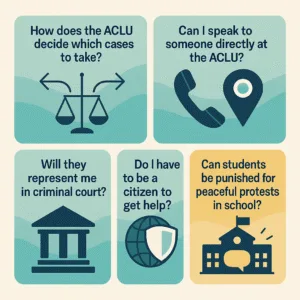
The Ultimate Guide to the ACLU: Services, Rights Protection, and How to Get Involved
The American Civil Liberties Union (ACLU) is one of the most influential organizations protecting civil rights and liberties in the United States. Whether you need legal help, want to understand your rights, or are searching for ways to support civil liberties, the ACLU provides the resources and advocacy you need.
- What Is the ACLU and How Does It Work?
- How to Get Legal Help from the ACLU
- Know Exactly What Rights They Defend
- What You Can Do to Support or Get Involved
This guide covers everything you need to know about the ACLU—from how it fights for your rights in court and the types of cases it takes, to the protections it offers for free speech, voting, reproductive freedom, and more. You’ll also discover practical ways to access legal help, participate in advocacy, and become part of the nationwide movement to defend constitutional rights for everyone. Whether you’re facing a civil liberties issue or want to take action for change, this resource will show you exactly where to start.

What the ACLU Can Do for You
The American Civil Liberties Union (ACLU) works through litigation, education, and advocacy to uphold civil liberties and protect your constitutional rights in real-life situations. Here’s what that means for you.
What Is the ACLU and How Does It Work?
The ACLU is a nonprofit legal and advocacy organization founded in 1920 to defend the freedoms guaranteed by the Constitution—especially the First Amendment. It uses three main strategies:
- Legal action: They sue governments, schools, law enforcement, and other institutions when civil rights are violated.
- Legislative advocacy: They push for laws that protect liberties, like the right to vote or bodily autonomy.
- Public education: They publish guides explaining your rights at protests, when stopped by police, in schools, and more.
Understanding the ACLU: Mission, Methods, and Meaning
How to Get Legal Help from the ACLU
The ACLU offers legal assistance through its nationwide network of state affiliates. Here’s how to get help:
- If your rights are being violated, go to the ACLU Affiliate Directory and select your state. Most affiliates have an online form where you describe your situation. They will contact you if it aligns with their legal criteria.
- They take cases that can make a wide impact, such as a city banning peaceful protests or a school punishing students for lawful speech.
- They do not take all cases. For example, they may not assist in personal disputes like landlord-tenant issues unless a civil liberties concern is involved.
How to Get Legal Help from the ACLU When Your Rights Are Violated
Know Exactly What Rights They Defend
The ACLU covers many issues. Here’s what you’re protected against—and what the ACLU may fight for on your behalf:
- Freedom of Speech and Assembly: You cannot be arrested simply for protesting, chanting, or holding signs in public. Police may not shut down peaceful gatherings without a legitimate safety reason.
- Police Misconduct: You have the right to film police in public. Unlawful searches and excessive force may be grounds for legal action.
- Reproductive Freedom: You have the right to access birth control, and in many states, abortion. The ACLU challenges laws that limit reproductive access.
- LGBTQ+ Rights: You cannot be fired or denied housing because of your gender identity or sexual orientation. The ACLU has won landmark cases upholding these rights.
- Immigration Rights: Regardless of status, you have rights to due process and humane treatment. The ACLU has successfully challenged unlawful detention and deportation practices.
- Voting Rights: If your voter registration is blocked, your polling place moved unfairly, or ID laws are restrictive, the ACLU may intervene.
6 Core Rights the ACLU Defends—and How They Protect You
What You Can Do to Support or Get Involved
You don’t have to be a lawyer to make a difference. Here’s how everyday people engage with the ACLU:
- Become a member: For a small monthly contribution, you’ll join a national network fighting for rights. Members receive action alerts, updates, and event invites.
- Sign petitions or email lawmakers: The ACLU’s Action Center makes it easy to contact your representatives about issues like surveillance or voting laws.
- Attend protests and events: Local chapters often organize public actions you can join.
- Volunteer: Many affiliates offer internships, canvassing, and event support roles.
Beginner’s Guide: How You Can Get Involved with the ACLU Today

FAQs
They prioritize cases with potential for wide legal impact, often involving systemic injustice or unconstitutional policies.
Yes. Use the affiliate directory to find your state’s contact info and office hours.
No. The ACLU protects civil liberties for all people in the U.S., regardless of immigration status.
Not usually. The ACLU focuses on civil liberties issues, not criminal defense—unless the case affects broader rights, like freedom of speech or protest.
No. Under Tinker v. Des Moines, students retain First Amendment rights in schools unless it causes major disruption.
You Have Rights. The ACLU Helps You Use Them.
Now you know what to do: if your rights are under threat, you can act. Whether you’re seeking help or offering it, the ACLU provides tools that empower you to protect yourself and others. Take advantage of them today.
